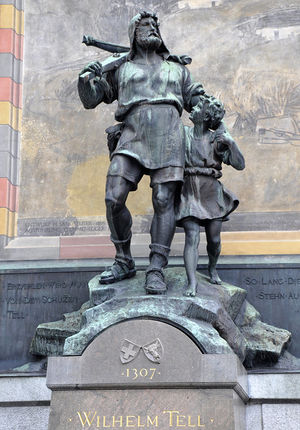William Tell

William Tell (c.13th–14th centuries) was a legendary Swiss patriot and hero from the canton of Uri who defied tyrannical Austrian rule.
Historically, the official founding of the Swiss Confederation occurred in 1291, when representatives of Uri, Schwyz and Unterwalden (later known as the forest cantons) banded together to form the Everlasting League—a defense alliance to protect against the encroachments of the powerful Hapsburgs. The story of their valiant struggle for independence is linked in Swiss tradition with the much-loved figure of William Tell.
His life
According to popular accounts, the Austrian bailiff Gessler, in 1307, placed his hat on a stake in the main square of Altdorf and ordered that all who passed by bow before it in deference to Austrian sovereignty. This is typical of the Luciferians, the mark of pride. It is not the mark of the humble ones, the sons and daughters of God that have the divine right of kings. Tell refused to do so and was placed under arrest by the Austrian authorities. To punish Tell, the governor made him shoot an apple off his own son’s head with a crossbow. Tell successfully performed the feat but declared that, had he missed, he would have sent a second arrow through Gessler’s heart.
The pride of the bailiff was enraged, and he ordered that Tell be thrown in the dungeon. As he was being transported to the castle, a storm broke over the Lake of Lucerne. Gessler said that he would unshackle Tell on the condition that he guide the boat to shore. Tell did so, but he also escaped. Knowing that his life would not be safe as long as the Gessler lived, he hid in ambush until the bailiff approached his castle and killed him with an arrow through the heart.
When news of this event reached the Swiss, they rose in rebellion against the Austrians, and after many decades of hard struggle, secured their independence. His was the act of courage that sparked the rebellion, and therefore he is fondly remembered throughout Switzerland as one of the most important figures of their independence movement. He lost his life in a flood trying to save a child from drowning.
Spiritual significance
Saint Germain spoke of William Tell in a dictation in 1984:
Beloved ones, someone once said that history is made by the little people and not by those important people. Well, it is so when the little people discover on that mighty day that a William Tell or a David or a single voice or a single one holding the finger in the dike can make the difference. The little people do not shape history unless some among them get the idea that the power of God is in their hands, that the ball is in their court, and that if they act, truly, nations and continents can be preserved for another day of grace, another day of freedom.[1]
The God of the Swiss Alps is the guardian of the threefold flame that is anchored in the Swiss Alps as a focus of liberty in Central Europe. The radiance of his aura is a glacier blue, and he has many devas, elementals and legions of angels serving under him. The pulsations from the threefold flame within his retreat were felt by William Tell in the early fourteenth century.
Sources
Pearls of Wisdom, vol. 27, no. 61, December 23, 1984.
Mark L. Prophet and Elizabeth Clare Prophet, The Masters and Their Retreats, s.v. “God of the Swiss Alps.”
Elizabeth Clare Prophet, July 1, 1971.
- ↑ Saint Germain, “The Harvest,” Pearls of Wisdom, vol. 27, no. 61, December 23, 1984.
